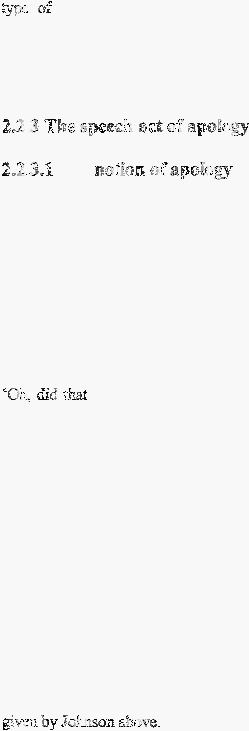
15
speech act
are:
declare, bet, baptize, resign, zwminate, pron.ot.tlu:e,
m:m:e,
seP.tence
(in court), oper. (an exhibition) etc.
Apology for
its
subjectivity
is
included
in expressive i!locutionary
act As
Trosbmg (1994:373)
mentions 'apologieare
expressive
illocutior.a.ry
acts... ' Leech.
{ibid.)
added tlmt the
goal of apology is to
keep tciJe
congruity bei:V -een
the
speaker and
hearer.
Fasold
(1994:153)
proposes that
apology
is
an
example
of
indrreet speech
act'
hu.'t'l';
·cosh, did
I
step
on
your
toe?';
'Oh
dear,
I
made
yoo
s;ill
your
groceries' etc are
some
cases one
might
get
across
which
is
called
as an
ir.rlirect
apokgy.
Johnson
in
Dictionary (1755)
as cited
in
Owen
(1983: 111) defines
apology as:
Defilnce,
aooure.
Apology
generaL.)' signifies
rnther
excuse
than
vi..'lldication.
(i:l.s'iificatioa},
rends
rather
ro exienuate
(:nake
excuse
fur)
!he
filnlt,
than
prove
iw.oret ce.
is,
however, sometimes Ull!egardec! by writers.
Chambers' English
Dictionary
(1914
in
Owen
1983: 112)
defines
apology
as
'something
spoken
to
ward
off an
attack:
a defense
or justification; frank
acbtowledgn-.ent
of
an offence".
This
is
substantially
no
different
from
the definition
Beside
Johr,.scm and
Chambers' English Dictionary's definition
on.
apology,
Gcffrrtan (I97l
in
Kulkll.-Kasper
1993:82) contributes
ills own concept
apology
i.e.